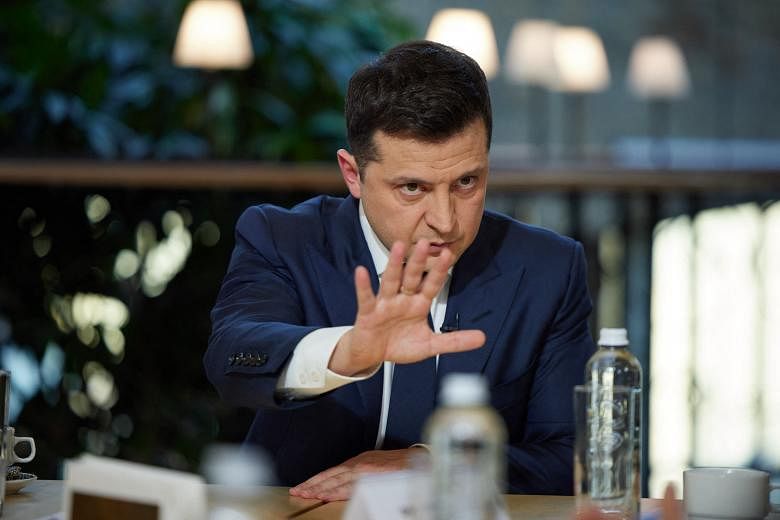KYIV (BLOOMBERG) - While Ukrainian President Volodymyr Zelensky has downplayed the likelihood of a large-scale invasion as Russia masses troops near the border, he is targeting what he sees as another threat to his country's sovereignty: oligarchs.
The President in a national address on Monday (Feb 14) slammed unidentified businesspeople for fleeing the country in the face of a United States warning of a potential imminent assault.
Russia has repeatedly denied it is planning to attack.
Mr Zelensky, a former comedian who campaigned in 2019 on promises to take back power from oligarchs in the former Soviet republic, has increased pressure on the rich since Russia began building up troop levels in November.
Ukraine's most influential businessmen have less than three months remaining to unload assets that qualify them as oligarchs under a law passed last year.
"It's like playing chess simultaneously against several opponents," said Mr Volodymyr Fesenko, head of the Penta research institute in Kyiv.
"It's a peculiarity of Ukraine's politics. Here external threats never distract the government from combating internal opponents."
The September law allows the National Defence and Security Council to define an oligarch using three of four criteria: their participation in public life, level of influence over mass media, ownership or control of a company with a monopoly and whether assets exceed 2.4 billion hryvnia (S$114.59 million).
Those given the label will be forced to disclose their assets and be banned from financing parties, holding government posts and participating in privatisations.
Justice Minister Denys Malyuska identified the country's richest man, Mr Rinat Akhmetov, and billionaire Igor Kolomoisky as potential targets in a Forbes Ukraine interview.
Pressure has been exerted in different ways, as well. Billionaire former President Petro Poroshenko, was ordered in January to surrender his passports during a treason investigation that he calls political.
Mr Akhmetov's Metinvest BV was raided in a tax probe on Feb 1.
Ukraine, which is among the poorest countries in Europe, has also sought to increase taxes on mining, iron ore and metal businesses that are concentrated in the hands of businessmen who also control its main media outlets, including Mr Akhmetov and Mr Kolomoisky.
Mr Akhmetov via his press office criticised the oligarch law as a violation of human rights that won't help Ukraine develop, and said Metinvest is a responsible taxpayer.
Mr Kolomoisky and a spokesman for Mr Poroshenko did not respond to requests for comment.
Mr Poroshenko sold his media assets to allies after the law was passed, and has criticised the legislation as an attempt "to shut up the independent media".
Mr Kolomoisky praised the law in an interview with Ukrayinska Pravda on Tuesday, saying it will help the rich justify the source of their wealth for foreign banks.
A UK court froze some of his assets in 2017 and he and his family were sanctioned by the US last year for corruption.
The focus on local power brokers comes as Ukraine finds itself at the epicentre of the biggest European security crisis since the Cold War.
Russia has deployed more than 100,000 troops near the border in what Western officials say could be a prelude to an invasion.
President Vladimir Putin blames the tensions on the West. He has called on the US and the North Atlantic Treaty Organisation to provide security guarantees and block more former Soviet states from entering the alliance.
The crisis has not rallied the nation around Mr Zelensky, who is up for re-election in 2024.
In a January Kyiv International Institute of Sociology poll, 24 per cent of voters support the president, while Mr Poroshenko trailed him by less than the margin of error.
The situation may be an attempt to copy Mr Putin's strategy at the beginning of his presidency to reassert state's authority by asserting control over the media and arresting Russia's then-richest person, Mr Mikhail Khodorkovsky, according to Mr Viktor Zamyatin, an analyst at the Razumkov Centre for Economic and Political Studies in Kyiv.
"I don't think it will work," Mr Zamyatin said.

